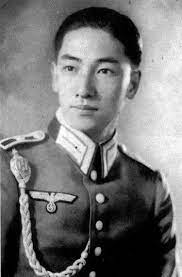Chiang Wei-kuo (6 October 191 6-), the younger son of Chiang Kai-shek, military officer who held important posts in Taiwan.
Born at Shanghai, Chiang Wei-kuo was raised as the second son of Chiang Kai-shek. Little is known of his childhood or early education. Between 1934 and 1936 he studied physics at Tung-wu University at Soochow and also became a reserve officer in the Kiangsu provincial training corps. In September 1937 Chiang went to Europe and enrolled at the Kriegshochschule in Munich, where he was known as Wego W. K. Chiang. He studied the German language and German military science. After receiving an honorary commission as a second lieutenant, Chiang was assigned for training purposes to the 98th (Jager) Regiment, and he participated with that unit in the German invasion of Austria in March 1938. After the Second World War broke out in September 1939, Chiang left Germany for the United States, where he spent about a year as a cadet at the Air Corps School at Maxwell Field, Alabama, and at the United States Army's Armored Center at Fort Knox, Kentucky. On 31 March 1940 he addressed a rally in New York's Chinatown. He condemned the actions of Wang Ching-wei (q.v.) as the leader of the Japanese-sponsored government at Nanking. Chiang returned to China in November 1940. After receiving political indoctrination, he was assigned in 1941 to the 1st Infantry Division of the First Army as a second lieutenant. Under the command of Hu Tsung-nan (q.v.), a favorite of Chiang Kai-shek, the First Army, with headquarters at Sian, stood guard against the Japanese forces deployed along the Yellow River bend near Tungkuan and against the Chinese Communist forces (which nominally were allied with the Nationalists) to the north. Because he spoke English, Chiang was selected to escort Wendell Willkie and his party on a tour of the Shensi front in 1942. Chiang became a Christian in June 1943, with the Methodist bishop of west China officiating at his baptism. In August, he went to India for advanced training at the tank center which the United States Army had established. A few months later, he returned to China and rejoined his unit at Tungkuan. He remained with the 1st Infantry Division until 1945 and advanced to the rank of major. In 1945 Chiang was promoted to lieutenant colonel and was assigned to command a battalion of the 616th Infantry Regiment. During the civil war with the Communists, he served chiefly with armored units, notably the 1st Tank Regiment, in which he was executive officer and then deputy commander. The entire armored force of the Nationalists participated in the massive Hwai-Hai battle that began on the eastern segment of the Lunghai rail line in early November 1948, and Chiang Wei-kuo, by then a colonel, served as its deputy commander. In that critical battle, the Nationalists lost almost all of their equipment. Chiang Wei-kuo and other senior Nationalist officers escaped from Hsuchow and avoided capture by the Communists. After the Nationalist removal to Taiwan, Chiang Wei-kuo served from 1950 to 1953 as commanding general of the Armored Force m Command. In 1953 he went to the United States to attend the Command and General Staff College at Fort Leavenworth, Kansas. After his return to Taiwan in July 1955, he became deputy director of the G-3 (operations) division of the ministry of national defense, in which his brother, Chiang Ching-kuo (q.v.), held high office. In March 1958 Chiang Weikuo became director of the G-5 (planning) division and deputy chairman of the joint operations planning group in the ministry of national defense. Later that year he resumed command of the Armored Force Command, with the rank of major general. In 1959 he attended the United States Army Air Defense School at Fort Bliss. After his return to Taiwan, Chiang was promoted to the rank of lieutenant general and was named commandant of the Command and General Staff College of the Chinese Army. Despite his military background, Chiang Weikuo was not regarded as a figure of major political influence in Taiwan. After returning from the United States, he became an active member of the Taipei Rotary Club, which was composed primarily of Americans and Englishspeaking Chinese. During the Sino-Japanese war, Chiang Weikuo married Shih Ching-i, the daughter of a prosperous businessman from the Northeast; she died in childbirth in Taiwan. Chiang later married Ellen Chiu, an attractive woman of Chinese-German parentage.

蒋纬国
蒋纬国(1916.10.6—),蒋介石的次子,在台湾任重要军职。蒋纬国生在上海。他的幼年情况不详。1934—1936年在苏州东吴大学学物理学,并为江苏省训班后备军官。
1937年9月,他去欧洲,进慕尼黑的军事学校学习德文和德国军事科学。他在获得少尉荣誉军衔后,进德军九十八团见习,1938年3月,随军入侵奥地利。
1939年9月,第二次世界大战爆发后,蒋纬国离德去美国,历时一年,先后在美国阿拉巴马州马克斯韦尔基地空军学校,及肯塔基州诺克斯堡陆军装甲部队中心当学员。1940年3月31日在纽约唐人街的一次集会上,他发表演说,谴责汪精卫在南京成立日伪政府。
1940年11月,蒋纬国回国,经政治训练后,于1941年在第一军第一步兵师任少尉。第一军由蒋介石的亲信胡宗南统率,军部设在西安。第一军的任务是阻拦分布在潼关附近黄河河套一带的日军和抵御北边的共产党军队(名义上与国民党联合)。由于蒋纬国通英语,1942年时由他陪同威尔基等一行视察陕西战线。1943年6月蒋纬国由华西卫理公会主教主持其洗礼仪式而成为基督教徒。8月,他去印度进美国陆军主办的坦克中心受高级训练。几个月后回国,重回
驻守在潼关的部队。直到1945年他才离开第一师,当时已晋升为少校。
1945年蒋纬国晋升为中校,任第616步兵团的营长。在与共产党作战期间,他主要是在装甲部队中服役,在第一坦克团中先任主任参谋后任副团长。国民党装甲部队全部参加了1948年11月初在陇海路东段开始的淮海大战。当时
已获上校军衔的蒋纬国担任装甲部队副司令官。在此次关键性的战役中,国民党几乎损失了全部装备。蒋纬国和其他国民党高级将领逃出徐州,免于被共产党俘虏。
国民党迁到台湾后,蒋纬国于1950—1953年任装甲部队总司令。1953年,他去美国,进堪萨斯州利文沃思堡的指挥参谋学院,1955年7月回到台湾,任国防部G—3作战处副主任,其兄蒋经国则在国防部任要职。1958年3月,任G
一5计划处主任、兼国防部联合作战计划小组副主席,同年年底,任装甲部队少将司令。1959年,进布利斯堡的美国陆军防空学校,回台湾后,晋升为中将,任中国陆军指挥参谋学院院长。蒋纬国在台湾只是在军界有其地位,并不
是在政治上有重大影响的人物。他从美国回来后,成了台北扶轮社的活跃分子,参加该社主要的是美国人和会说英语的中国人。
中日战争期间,蒋纬国和东北的一位富商的女儿石静岩结婚,她在台湾分娩时去世,蒋纬国后又和一位美貌的中德混血女子艾伦·德丘(译音)结婚。